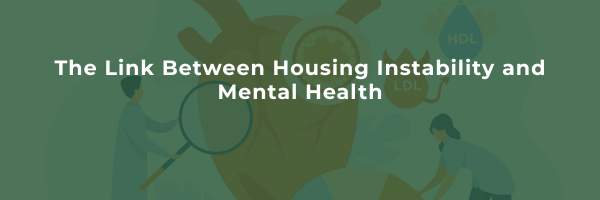The Link Between Rent Stress and Mental Health

The Link Between Housing Instability and Mental Health
Did you know that instability in housing may lead to mental health issues — and mental health problems can also make it harder to maintain stable housing?
Research by the Money and Mental Health Policy Institute found that people experiencing difficulties in paying rent are more likely to develop mental health problems. Financial strain and housing insecurity can cause high stress levels and anxiety, which may affect motivation, problem-solving ability, and overall emotional well-being. Over time, this can lead to feelings of hopelessness and a diminished sense of purpose.
On the other hand, people already living with mental health conditions may also struggle to manage finances or meet rental obligations, further worsening housing instability. In Kenya, especially during these challenging economic times, studies show that individuals facing housing insecurity are highly likely to experience mental health issues.
For this reason, secure housing must sit at the heart of any mental health plan. Housing stress quickly turns into mental distress. While a lot of resources go into treating chronic mental health conditions, some of these challenges could be prevented if housing stability were prioritized.
Housing — or shelter — is a basic survival need in Maslow’s hierarchy of needs, and should therefore be treated as a key priority during household financial planning.
How to Prevent Mental Health Challenges Linked to Rent Payment Struggles
1. Create a Budget
Plan your income carefully and choose housing that aligns with your financial capacity. Seek guidance from financial advisors where possible or consider taking financial literacy courses to better manage income and expenses.
2. Avoid Penalties Due to Late Rent Payment
Most landlords charge penalties when rent falls due and remains unpaid. These charges increase the financial burden and can heighten stress levels. Paying rent promptly helps reduce such risks.
3. Communicate with Your Landlord
Maintaining open communication with your landlord during tough economic times can ease stress. Many landlords understand that challenges arise — it’s important to be proactive and explain your situation in advance.
4. Set Up a Rent Arrears Payment Plan
Running away or avoiding communication over rent arrears often creates a heavier psychological burden. Instead, face the issue boldly — discuss a repayment plan and make a clear commitment. This helps relieve guilt, anxiety, and mental strain.
5. Consider Moving to an Affordable Place
If your current rent is consistently unmanageable, it may be wise to move to a more affordable home. Living within your means reduces financial pressure and promotes peace of mind.
Stable housing is more than just a roof over your head — it’s a foundation for mental well-being. By making intentional financial decisions and seeking support early, households can reduce both financial and emotional stress, creating room for a healthier, more balanced life.
Article by:
Phylis Waichanguru
Property Executive
Popular posts
-
Are you insured?
Blog
admin
-
Understanding taxation of residential rental income in Kenya
Blog
admin
-
Landlords & Tenants Rights in Kenya
Blog
admin
-
Embracing Technology: The Key to Staying Ahead in Kenya's Real Estate Market
Blog
admin
-
Strategies for Investing In Real Estate
Blog
soad
-
Beyond Nairobi: Emerging Real Estate Hotspots in Kenya
Blog
soad
-
Sustainable & Green Building Practices
Blog
soad
-
Real Estate Market Trends & Forecasting in Kenya
Blog
soad